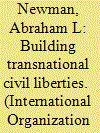| Srl | Item |
| 1 |
ID:
081559


|
|
|
|
|
| Publication |
2008.
|
| Summary/Abstract |
Scholars of international relations usually argue that democracies are better able to signal their foreign policy intentions than nondemocracies, in part because democracies have an advantage in generating audience costs that make backing down in international crises costly to the leader. This article argues that the conventional hypothesis underestimates the extent to which nondemocratic leaders can be held accountable domestically, allowing them to generate audience costs. First, I identify three factors contributing to audience costs: whether domestic political groups can and will coordinate to punish the leader; whether the audience views backing down negatively; and whether outsiders can observe the possibility of domestic sanctions for backing down. The logic predicts that democracies should have no audience costs advantage over autocracies when elites can solve their coordination dilemma, and the possibility of coordination is observable to foreign decision makers. Empirical tests show that democracies do not in fact have a significant signaling advantage over most autocracies. This finding has important implications for understanding the relationship between regime type and international relations
|
|
|
|
|
|
|
|
|
|
|
|
|
|
|
|
| 2 |
ID:
081561


|
|
|
|
|
| Publication |
2008.
|
| Summary/Abstract |
Democratic nations have long struggled to set the proper balance between individual freedom and government control. The rise of digital communications networks, market integration, and international terrorism has transformed many national civil liberties issues into important international debates. The European Union was among the first jurisdictions to manage these new transnational civil liberties with the adoption of a data privacy directive in 1995. The directive substantially expanded privacy protection within Europe and had far-reaching consequences internationally. While international relations scholars have paid considerable attention to the global ramifications of these rules, research has not yet explained the origins of the European data privacy directive. Given the resistance from the European Commission, powerful member states, and industry to their introduction, the adoption of supranational rules presents a striking empirical puzzle. This article conducts a structured evaluation of conventional approaches to European integration-liberal intergovernmentalism and neofunctionalism-against the historical record and uncovers an alternative driver: transgovernmental actors. These transgovernmental actors are endowed with power resources-expertise, delegated political authority, and network ties-that they employ to promote their regional policy goals. This article uses the historical narrative of the data privacy directive to explain the origins of a critical piece of international civil liberties legislation and to advance a theoretical discussion about the role of transgovernmental actors as policy entrepreneurs within the multilevel structure of the European Union
|
|
|
|
|
|
|
|
|
|
|
|
|
|
|
|
| 3 |
ID:
081560


|
|
|
|
|
| Publication |
2008.
|
| Summary/Abstract |
This article addresses a puzzle: dictatorships that practice torture are more likely to accede to the UN Convention Against Torture (CAT) than dictatorships that do not practice torture. I argue the reason has to do with the logic of torture. Torture is more likely to occur where power is shared. In one-party or no-party dictatorships, few individuals defect against the regime. Consequently, less torture occurs. But dictatorships are protorture regimes; they have little interest in making gestures against torture, such as signing the CAT. There is more torture where power is shared, such as where dictatorships allow multiple political parties. Alternative political points of view are endorsed, but some individuals go too far. More acts of defection against the regime occur, and torture rates are higher. Because political parties exert some power, however, they pressure the regime to make concessions. One small concession is acceding to the CAT
|
|
|
|
|
|
|
|
|
|
|
|
|
|
|
|
| 4 |
ID:
081558


|
|
|
|
|
| Publication |
2008.
|
| Summary/Abstract |
Domestic economic institutions change through processes of conflict and bargaining. Why do the strongest groups in such conflicts ever change their minds about the acceptability of institutional arrangements they once opposed? Drawing on the cases of Ireland in 1986-87 and Italy in 1989-93, this article demonstrates how the process of common knowledge creation between employers and unions changed the course of negotiations over national wage bargaining institutions. Common knowledge creation happens when existing institutions are in crisis. The institutional experimentation that follows such crises, characterized by deep uncertainty, places a premium on persuasive argument. The ideas most likely to serve as the basis for newly common knowledge will have analytical and distributive appeal to both unions and employers, and they must be ratified in public agreements, which I call common knowledge events. Common knowledge events establish new social facts, which can change the payoffs associated with different institutional outcomes. This can lead even powerful actors to accept institutions they had previously opposed.
|
|
|
|
|
|
|
|
|
|
|
|
|
|
|
|